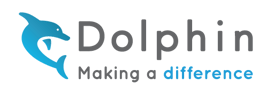
Case Study: Colin Phelan
As the owner-operator of a management consultancy across the UK and Ireland, Colin Phelan has enjoyed a successful and uninterrupted 35 years in business.
We asked him about his career and the part that assistive technology - specifically Dolphin Supernova - played in his success.
How long have you used Dolphin Supernova?
It became apparent in the mid 90’s that as my eyesight was deteriorating, alongside the introduction of desktop computers in the workplace, I was going to have to find a long-term solution to enable me to continue to develop my career.
When I was successful in securing new employment in 1998, I made an Access to Work application. As a combination of screen magnification and speech was the optimum solution for me at that stage, Dolphin Supernova version 2.01 was recommended as the most integrated product in the marketplace.
I have continued to use Dolphin Supernova as my primary assistive technology throughout the intervening 21 years.
What do you require assistive technology software to do in your role?
At least 80% of my role involves reviewing and producing electronic documents. Without the access provided by a screen reader and magnification software, this would not be possible. As a result I would not be able to do my job.
How large a part does your computer play in your job?
As with many people in office jobs these days, computer work plays a significant part of my role.
Even the parts of my job that do not directly involve my computer - such as running workshops and attending meetings - still require computer access, so I can prepare and record information.
Can you tell us about your eye condition?
I have an inherited eye condition called Retinitis Pigmentosa, which was diagnosed at a very early age, as an older brother and sister of mine also have the condition. This has resulted in a gradual regression of my eyesight from birth until now, aged 51.
While I have always been severely visually impaired, I consider myself fortunate to make it through my education and twenties doing the vast majority of things that my fully-sighted friends were doing.
My residual remaining sight is now about 3%, which means I am fully reliant on the screen reader facility within Dolphin Supernova at work and my guide dog for mobility. Onwards and Upwards!
You’ve invested time into researching assistive tech. What would you advise people to consider when choosing their own solution?
I would not call myself an expert in accessible computer solutions, however I am an expert on what works for me. I have always considered technology as a means to an end as opposed to being ‘the end’. As I have gone through my career, my reliance on different aspects of technology such as scree magnifiers and screen readers has increased in line with my sight loss.
My advice would be to be clear as to the issues you are having, define them, engage with people in the sector who can put forward the available options and try them out for yourself.
Speak to the team at Dolphin who can go through the product options available to you, so you can find one which will suit your lifestyle and your needs at work.
It is truly important to maintain control of the process of identifying and implementing your solution. This way you will end up with the right technology to meet your needs.
Why did you choose SuperNova and which features do you find most useful?
When I first researched the market for screen readers and magnification software, I felt it was extremely useful to have the option for both screen reader and magnification to be used in parallel.
While there are a number of screen reader options on the market, plus magnification options. The only software that offered both together as a fully integrated solution was Dolphin Supernova.
It means i can seamlessly switch between magnifier and screen reader, or I can use them simultaneously. Even with especially poor vision, the magnification functionality is extremely useful for orientation and contextualising the screen. This function can't be underestimated!
Something that I regularly use is the function that speaks the whole document. My ability to physically listen to an entire document - rather than reading it - is very helpful. I believe that studies exist that show reading results in many words being missed and people reading what they would like it to say, rather than what it does say. So listening to documents gives me the advantage in this respect.
My professional role involves writing and reviewing tender and marketing documents, often up to dozens of pages in length. The ability to review through listening to the text, allows forensic review of the ‘story being told’ and helps create a compelling narrative.
How does assistive technology help you do your job?
Without screen reader and magnification software, I simply would not be able to do my job. I do often consider how fortunate I am to be visually impaired in 2019 rather than 50 years previous.
Your employers have been supportive. What key advice would you give to employers when considering computer accommodations for staff?
As I reflect back on my career, I can identify more occasions when employers have not been prepared to take a chance on employing a severely visually impaired member of staff, than occasions when they have done so.
In no small way, that reticence is why I left large corporate employment, firstly to join a smaller firm and thereafter to start my own company.
As a generalisation, people who work in large corporate or public sector organisations are not there because they like taking risks in the workplace. They are there for the apparent security and this is unlikely to change. So what needs to change is the belief that employing someone who is severely visually impaired is any more of a risk than employing a fully able person. I am aware this is a challenge as we tend to form our first impression in the first seven seconds of meeting someone!
Exposure to and experience of the unknown removes fear. This is the 'difference that will make the difference’ and facilitate more severely visually impaired people into the workplace.
On reflection, each employer that took a chance on me had their own personal reasons for taking that chance, which became apparent as I got to know them. I am now retrospectively confident that no employer had to contribute more to me than I contributed to them and their business during my employment.
We all have unique skills and talents. I suggest a focus on the ‘flip side’ - what CAN be done - and how to address issues proactively, through the use of technology or other strategies.
We are employed to take problems away from our employer - not bring problems to them - and this is not going to change, so we must. Supporting all employees to create an environment where they have access to their talent is the role of all leaders. This is no different when employing fully abled staff or disabled staff.
What advice would you give to someone trying SuperNova for the first time?
First, consider what functionality you require and become proficient operating these functions. Do this to the extent that you can concentrate on doing the job, not concerning yourself with the technology.
Thereafter, make time after the working day to gain greater understanding of the breadth of functionality that SuperNova offers. Choose a topic and teach yourself using Manuals or Tutorials on the Dolphin website. This provides the additional knowledge of the tools which are at your disposal.
With regard to the screen reader, find the voice that works best for you. Many people including myself, find the synthetic voices work better for consuming large quantities of text at high speed. If you gradually speed up the voice, you will quickly find listening efficiency greatly increased and I suggest this may be on a par with fully sighted colleagues in the review of documents.
What developments would you like to see in the future?
It is a constant challenge for Dolphin to keep up with developments in the mainstream operating system and software market. If there was a way of assistive technology with the range of functionality of Supernova, being closer integrated with evolving mainstream software - including social media - this would be particularly beneficial.
At the speed that technological advances are moving, I think the future of assistive technology for visually impaired members of society will be very positive.
About Colin
Colin Phelan is the Director and founder of Acumental Limited.
He has a wealth of knowledge and experience, established over a period of over 30 years. By fully utilising his qualifications and experience in Building Engineering and Facilities Management - along with leadership management & executive coaching skills - Colin has made significant improvements and developments in the public and private sectors in a range of markets.
Colin has established a significant client base in the public & private sectors to deliver real and measurable transition and change solutions for contractors and end users.
 About SuperNova
About SuperNova
SuperNova empowers users with visual impairments to succeed in employment. It enables independent computer access at work through a screen magnifier and/or screen reader. Speech and braille support are also available.
The world-leading technology of SuperNova empowers users to easily and independently read the content of their computer screens, either by magnifying the screen, reading the text aloud or using a screen reader that communicates everything on screen. SuperNova also has add-ons for scanning and reading printed material.
Find out how Dolphin SuperNova can help you support the team members with visual impairments in your business. Call our team on 01905 754 577 or email info@yourdolphin.com
Explore Dolphin SuperNova
Choosing SuperNova means organisations can give all employees with visual impairments the technology they need to succeed at work, so they can reach their full potential.
Available in three editions:
SuperNova is suitable for Windows tablets, laptops and desktop computers. Users have complete access to Windows applications which means they an write and edit documents, use MS Office applications and research in Chrome, Firefox or Edge browsers.
We also offer free 30-day trials of SuperNova.
SuperNova Enterprise
Now working from home is commonplace for most employers, SuperNova Enterprise is the best choice of Magnifier & Screen Reader for remote access across Citrix, remote desktop services & VMware.
It gives employees who are blind and partially sighted remote access to your networks. Find out more about SuperNova Enterprise for your business.



Let Us Know What You Thought about this Post.
Write your comment below.